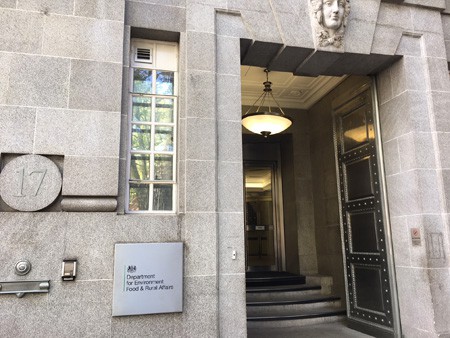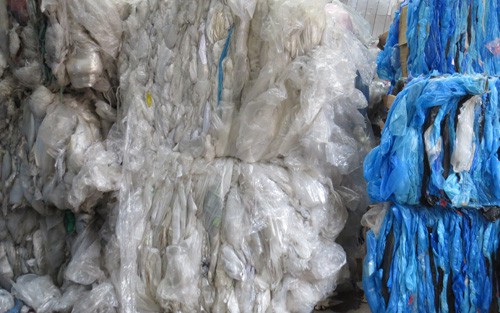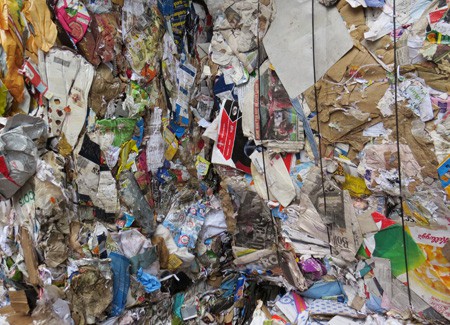Local authorities could face a reduction in income from recyclable materials because of restrictions on the export of some recyclables to China, a pre-Christmas meeting called by Defra has heard.
Officials at the Department for Environment, Food and Rural Affairs summoned local authorities and some trade associations on Wednesday (December 20) to get an up-to-date picture of what the restrictions might mean.

Defra has opened its doors for a meeting on exports of recyclables to China
China is prohibiting the import of mixed paper (‘unsorted’) and also a number of plastic grades, which will hit some plastics from the municipal waste stream which have traditionally been sent to China. Also impacted is plastic film recovered from back of retail stores. Cardboard can still be moved although tighter restrictions on the level of contrary material come into force from March 2018.
While there is still the potential for Chinese authorities to make some concessions over the proposals, Defra is understood to be keen for the UK to be prepared to cope with any volumes of waste materials for recycling which can’t be moved to alternative markets.
A spokesman for the Department said: “We are continuing to work with the waste industry and the Environment Agency to understand the impact across the sector of the Chinese government’s proposed restrictions on waste imports.
“We are also looking at ways to process more of our recycling at home as part of our resources and waste strategy.”
Local authorities
The impact on local authorities was discussed at the meeting. Some local authorities are thought to be facing particular pressures, especially if they run their own ‘small’ materials recycling facility and have trouble finding markets for their plastics and mixed paper.
Those councils who collect plastic pots tubs and trays (PTT) could see any rebates squeezed. Others, such as Hampshire don’t bother to collect PTT although this has attracted some criticism from recycling minister, Therese Coffey. The county is served by Veolia which cannot sort PTT at its two MRFs – instead it sends the material for energy recovery and is likely to continue to do so until it builds a proposed new MRF.

Better quality film (centre) can still be moved without difficulty to European markets but lower grades (left) and jazz film (right) is harder to place
After the Defra China meeting, Lee Marshall, chief executive of the local authority recycling officers group, LARAC, told letsrecycle.com: “Local authorities will still collect the materials and will have to find alternative markets. It depends on the level of income lost.”
And, he expressed concern about the potential incineration of some plastics because of the market difficulties.
Mr Marshall remarked: “If we get to a point where we can’t find markets for plastics and it is being sent to energy from waste then that would not be a good situation.”
EA ‘proactive’
Official monitoring of the situation is being undertaken by the Environment Agency which is being seen as taking a ‘proactive view’. An Environment Agency spokesperson said: “We are working closely with Defra and the waste industry to discuss current and likely challenges that the industry will face as a result of the restrictions.”
Local officers are thought to have been briefed as to how to view potential short term storage increases of some materials, with flexibility in allowable storage an option.
The Waste & Resources Action Programme (WRAP) is also involved in monitoring the changes in Chinese markets. WRAP said meetings convened had been “extremely well attended, with key players from right across the recycling supply chain including brands, retailers, manufacturers, reprocessors, trade bodies, as well as governments.
“The dialogue was constructive and engaged and we felt demonstrated a shared commitment to seeking solutions to the proposed Chinese import restrictions. We are still in discussions and should have more to share in the New Year.”
Waste firms
The waste management companies appear not to be panicking about exports or stockpiles so far. Paper is said to be moving to alternative markets, although one major operator told letsrecycle.com that the picture for plastics “is very difficult”.
The trade body for the companies, the Environmental Services Association, acknowledged that while the final export picture for China still needs to emerge the bans and quality limits so far would require more of a focus on quality for the whole supply chain. And, it is understood that Defra is pleased at the level of support and involvement shown by the waste management sector to try and resolve concerns.

MRF mixed material of low quality (2017) which can no longer be sent to China
The association said: “In the medium term this will also hopefully sharpen the government’s attention on the need to encourage more robust domestic end markets for the use of recycled materials here in the UK.
“We have not seen cases of non-compliant stockpiling so far, not least since some form of restrictions were expected, and materials have generally managed to find alternative markets. We believe that the UK’s material can achieve the right quality standards to find a home, but in some cases there may be additional processing costs.”
Positive
BIFFA: In terms of the waste management companies themselves, Biffa said the restrictions were an opportunity for the UK.
Mick Davis, managing director of Biffa’s RR&T division, noted: “We actually view the restriction of plastic imports into China as a real opportunity to repatriate plastics recycling back to these shores.
“We actually view the restriction of plastic imports into China as a real opportunity”
Mick Davis, managing director
Biffa, RR&T
“As one of the industry standard bearers in this space, we are looking at this positively. We will seek to develop additional processing capabilities as a response and we believe that this is a good thing for UK plc.”
FCC ENVIRONMENT: Paul Taylor, chief executive of FCC Environment, reaffirmed the company’s view that there was an ongoing need for the government to recognise the importance of UK infrastructure for recycling and waste management.
Mr Taylor added: “There will always be a market for quality materials but we must challenge the balance between quantity over quality. In our belief, the push for tonnes can promote recycling behaviours which are counterproductive.”
VEOLIA: For Veolia, Richard Kirkman, chief technology & innovation officer, said that the company has ensured “all its plastic recycling remains in the UK or Europe for reprocessing.” And, he claimed the firm is “actively moving up the plastics recycling supply chain and earlier this year officially opened our Dagenham Plastics Facility enabling us to keep plastic recycling in the UK.”
Quality
SUEZ UK: Previously, Mark Woodroffe, head of trading for Suez UK has highlighted the need to capture higher quality material from incoming streams. And, he has explained that Suez UK is working with the Suez Group to review operational processes regarding quality control – “ensuring we capture as much higher-grade material from incoming streams as possible to utilise in alternative markets and more accessible sectors of the market.”
Exports
Simon Ellin, chief executive of the Recycling Association, which represents many exporters of paper and plastics for recycling, said that there would remain good demand in China for cardboard because the country exported so many goods in cardboard boxes to the West.
The post Defra looks at impact of Chinese rules on councils appeared first on letsrecycle.com.
Source: letsrecycle.com Plastic



